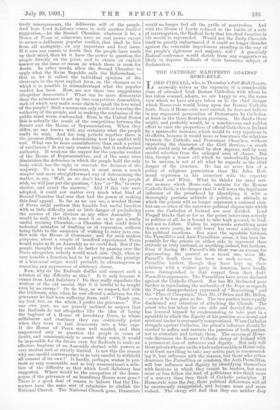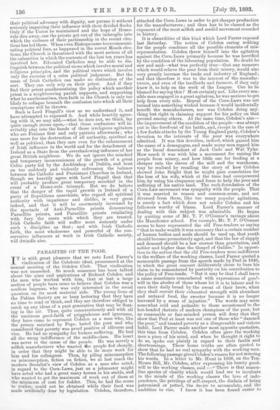THE CATHOLIC MANIFESTO AGAINST HOME-RULE.
LORD FINGALL, who, in Thursday's Pall Mall Gazette, avowedly writes as the exponent of a considerable class of educated Irish Roman Catholics, with whom he has taken counsel, adopts, we are happy to see, the same view which we have always taken as to the chief danger which Home-rule would bring upon the Roman Catholic faith. Even if Home-rule were carried, he does not believe in any organised persecution of Protestants by Catholics, at least in the three Southern provinces. He thinks there might, and probably would, be a mischievous and sudden effort to raise the proportion of official Catholics in Ireland by a spasmodic increase, which would be very injurious in its effects, because it would more or less strain the relations between the Catholic and Protestant Churches, without improving the character of the Civil Service,—a, result which could only be effected by slow degrees, and by very careful selection from the enlarged area of choice. But this, though a minor evil which he undoubtedly believes to be serious, is not at all what he regards as the chief danger of the situation. Ho has no more fear of a policy of religious persecution than Mr. John Red- mond expresses in his interview with the reporter of Black and White. What he thinks the most seri- ous menace which Home-rule contains for the Roman Catholic faith, is the danger that it will lower the legitimate influence of the priesthood by identifying it with a thoroughly partisan attitude in politics, an attitude in which the priests will no longer represent a national view, but one or other of the narrower political cliques into which even the Catholics of Ireland are now divided. Lord Fingall thinks that so far, as the priest intervenes actively in politics at all, he is bound to take high ground, to lead, and not to follow. Unless he represents something more than a mere party, he will lower his moral authority by his political exertions. But since the squabble between the Parnellites and Anti-Parnellites arose, it has been im- possible for the priests on either side to represent their attitude as truly national, as anything, indeed, but factious. Even if during Mr. Parnell's life there was an excuse for representing the quarrel as a moral one, since Mr. Parnell's death there has been no such excuse. The Parnellite leaders, though they have kept up their relations with a violent party in America, have hardly been distinguished in that respect from their Anti- Parnellite opponents. The Parnellites have never declared against the Catholic Church. Nor has Mr. Redmond gone further in repudiating the authority of the Pope as regards the Papal disapprobation expressed of "Boycotting" and the "Plan of Campaign," than Mr. O'Brien and Mr. Dillon, —even if he has gone so far. The two parties have equally disclaimed any intention of attacking the Church. The priest who has taken the one side and decried the other, has lowered himself by condescending to take part in a squabble in which the dignity of his position as a moral and spiritual leader is necessarily compromised. When Catholics struggle against Catholics, the priest's influence should be exerted to soften and restrain the passions of both parties, not to stimulate and irritate them. The success of Home- rule threatens the Roman Catholic clergy of Ireland with a permanent loss of influence and dignity. Not only will those priests who are on the whole unfavourable to Home-rule, or at least unwilling to take any active part in recommend- ing it, lose influence with the masses, but those who either denounce the Parnellites or condemn the Anta-Parnellites, will lose influence and dignity by identifying themselves with factions in which they cannot be leaders, but must more or less follow the lead of politicians who think more of a war-cry than they think of Catholic principles. If Home-rule wins the day, these political differences will all be enormously exaggerated, and become more and more violent. The clergy will find that they can neither drop their political advocacy with dignity, nor pursue it without seriously impairing their influence with their divided flocks. Only if the 'Union be maintained and the hope of Home- rule dies away, can the priests get out of the imbroglio into which the violence of their partisanship in the recent elec- tions has led them. When even Bishops come to excommuni- cating political foes, as happened in the recent Meath elec- tions, the Church is threatened with the most serious of all the calamities in which the contests of the last ten years has involved her. Educated Catholics may be able to dis- tinguish between the political views which involve moral and religious principles, and the political views which involve only the exercise of a calm political judgment. But the mass of Irish Catholics can make no distinction of the sort. They can only rely on their priest. And if they find their priest anathematising the policy which another priest in a neighbouring parish supports, and supporting what he anathematises, then faith in the Church is only too likely to collapse beneath the confusion into which all their conceptions will be thrown. Such is Lord Fingall's view as we understand it, and have attempted to expound it. And while heartily agree- ing with it, we may add,—what be does not, we think, lay quite enough stress upon,—that these confusions will in- evitably play into the hands of those irreligious agitators who are Fenians first and only patriots afterwards ; who care more for the destruction of all authority, spiritual as well as political, than they care even for the enhancement of Irish influence in the world and for the detachment of Ireland as a State from the overshadowing influence of her great British neighbour. We do not ignore the mischief and temporary inconveniences of the growth of a great Celtic party led by the Archbishop of Dublin, and bent on too suddenly and violently redressing the balance between the Catholic and Protestant Churches in Ireland, though we heartily agree with Lord Fingall that that will probably produce great temporary mischief in the event of a Home-rule triumph. But we do believe that the danger of the rapid growth in Ireland of a party of Republican anarchists, who regard all spiritual authority with impatience and dislike, is very great indeed, and that it will be enormously increased by the spectacle of Anti-Parnellite priests denouncing Parnellite priests, and Parnellite priests retaliating with fury the scorn with which they are treated. Irish Catholic faith will suffer most seriously under such a discipline as that ; and with Irish Catholic faith, the most wholesome and powerful of the con- servative influences at work in Irish Catholic society, will dwindle also.



































 Previous page
Previous page